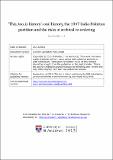Files in this item
'This, too, is history' : oral history, the 1947 India-Pakistan partition and the risks of archival re-ordering
Item metadata
| dc.contributor.author | Raychaudhuri, Anindya | |
| dc.date.accessioned | 2022-03-25T10:30:05Z | |
| dc.date.available | 2022-03-25T10:30:05Z | |
| dc.date.issued | 2021-09-01 | |
| dc.identifier | 276420753 | |
| dc.identifier | 5db202a0-7b77-4a06-bd3a-ec2def0e2f2f | |
| dc.identifier.citation | Raychaudhuri , A 2021 , ' 'This, too, is history' : oral history, the 1947 India-Pakistan partition and the risks of archival re-ordering ' , Oral History , vol. 49 , no. 2 , pp. 69-80 . < https://www.ohs.org.uk/scripts/journal-search.php?parameter=issue&searchkey=104 > | en |
| dc.identifier.issn | 0143-0955 | |
| dc.identifier.other | ORCID: /0000-0001-5174-4382/work/102330528 | |
| dc.identifier.uri | https://hdl.handle.net/10023/25103 | |
| dc.description.abstract | Drawing on interviews from my oral history project focusing on the 1947 India/Pakistan partition, in this article, I critically examine the process through which an individual oral history interview becomes part of an archive. I suggest that this process involves an extraneous stabilising, or re-ordering of meaning. The way we use oral histories that we collect, I argue, risks reinforcing some of the problematic political power-dynamics that oral history has hoped to combat. The process of incorporating an oral history interview into an archive is a process of ordering, ironing out ambiguities of meaning, voice, authorship and authority. | |
| dc.format.extent | 491108 | |
| dc.language.iso | eng | |
| dc.relation.ispartof | Oral History | en |
| dc.subject | 3rd-DAS | en |
| dc.subject | AC | en |
| dc.title | 'This, too, is history' : oral history, the 1947 India-Pakistan partition and the risks of archival re-ordering | en |
| dc.type | Journal article | en |
| dc.contributor.institution | University of St Andrews. School of English | en |
| dc.description.status | Peer reviewed | en |
| dc.identifier.url | https://www.ohs.org.uk/scripts/journal-search.php?parameter=issue&searchkey=104 | en |
This item appears in the following Collection(s)
Items in the St Andrews Research Repository are protected by copyright, with all rights reserved, unless otherwise indicated.

